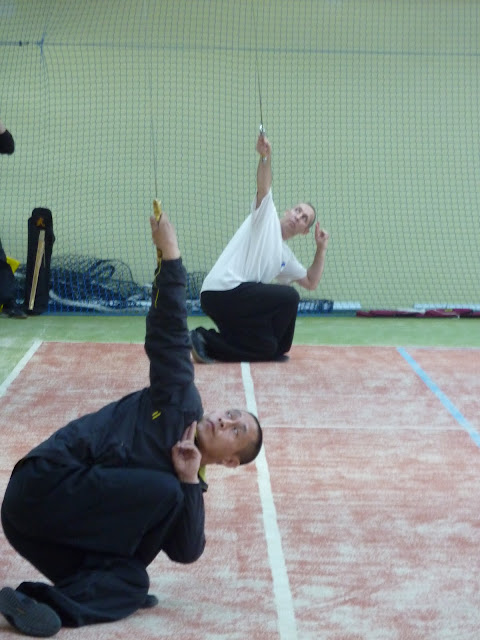Most of us who have committed years to seriously developing our Taijiquan (or any other sport or martial art) enjoy training - that is a given. Family, friends, colleagues etc might be hankering for time at the bar/beach/TV etc... but we want to...need to...MUST get in our daily quota of training. I was struck by a conversation I had with a long term and very committed student who also runs a successful osteopathic clinic. He happens to treat a number of professional sportsmen and women as well as the usual range of crocked people. We were discussing the difference between professional athletes and the multitude of weekend warriors. A major difference he found was the seriousness they attached to the slightest injury. Sorting this would take priority before they would be prepared to push their bodies to the max again. Compare this to the bravado of the aforementioned weekend warrior, who takes pride in pushing through his injuries during training.
Chen Taijiquan has at its heart the idea that we must strive for complete physical and mental balance. This is the basis for both the health and martial aspects of the system. In our school we have students in their 20 and in their 80s; some physically very powerful, some weaker; some living with illness,others in rude good health. Each can make a success of their Taijiquan if they tailor their training according to their own capacity. A quote I like is that "the best way to achieve a goal is to be fully present in the here and now - to be conscious of what's going on in our own bodies. Surpassing previous limits involves negotiating with your body, not ignoring or over-riding its messages". Don't be discouraged by the fantastic stories of other people's training eg. 12 hours a day, or the prodigious number of forms they (say) they do. Long term success comes from consistency. According to Dr James Loehr, author of Mental Toughness Training for Sports, who worked with famous sportspeople such as Jimmy Connors (tennis), Ray "Boom Boom" Mancini (boxing) and Dan Jansen (speed skating), the single most important defining quality of mental toughness is the capacity to do the right thing (even if that went against what you wanted to do) - that includes resting if your body is tired.
In an article on how to approach training, Chen Xiaowang said "you must not try to accelerate your progress by over-exerting your own limits. It does not work that way, there are no short cuts, and it means you must train yourself in stages, bit by bit. Train with moderation. Adjust the frequency of your training, the intensity and the level of difficulty and the height of your stances according to your age group, fitness level and physical health". Do your training at a level that is right for you - like a thermostat that changes the temperature of the environment in sync with the outside world.
The Essence of Taijiquan in Italian & Portuguese
Rome based Chen Taijiquan teacher Amanda Carloni (left) has done a fantastic job translating The Essence of Taijiquan into Italian. In the next few weeks it will also be available in Portuguese!
The Essence of Taijiquan in Italian & Portuguese
Rome based Chen Taijiquan teacher Amanda Carloni (left) has done a fantastic job translating The Essence of Taijiquan into Italian. In the next few weeks it will also be available in Portuguese!























